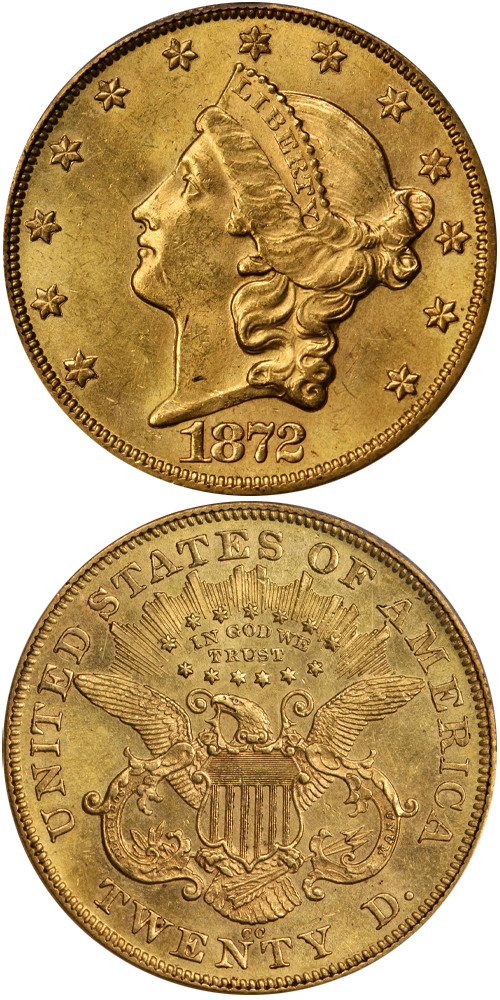1872-CC Liberty Head Double Eagle
Jeff Ambio: All known 1872-CC double eagles were struck from a single obverse die, the date large with the digit 1 close to, but not touching, the base of Liberty's neck. The digit 2, however, is somewhat low and closer to the denticles. We are aware of three different reverse dies for this issue. Winter 1-C is displayed with a small mintmark and is compact with the second C a bit higher than the first. The first C is centered over the right upright of the letter N in TWENTY and the second C is centered over the extreme left edge of the second letter T in the same word.
Rusty Goe: Bullion deposits poured in on a steady basis as the months passed in 1872. In May, Chief Clerk Henry B. Bostwick's report showed that the Carson Mint had executed over $1.1 million in coins and bars in April alone. The total $20 production of 29,650 for 1872 doubled the emission from the previous year, a good sign that business was on the rise, as the newspapers had declared all year.
Another discrepancy in mintage figures, which appear inherent in the Carson Mint's records from the early 1870s, affects the 1872-CC double eagles. Just as some modern researchers claim that the Carson branch turned out 2,700 more double eagles in 1871 than the Treasury Department has reported, they also say that 2,750 fewer were minted in Carson City in 1872. The two numbers are curiously similar: 2,700 versus 2,750. Perhaps the disparity in opinions can be explained by the confusion in fiscal-year versus calendar-year accounting.
On Thursday December 12, during the lunch hour, Jacob Straight in the machine shop heard an eerie, strangled scream coming from the adjoining room. When he rushed in he saw 60-year-old Ozro Parker stuck between the pulley-belt and the large wheel it propelled that revolved the amalgamating pan. The wheel's unrelenting motion had driven Parker's body to the ceiling, located only a foot above the top of the wheel. The spinning wheel's force crushed Parker into the ceiling. Straight immediately shut off the machinery and pulled desperately on Parker's body to free him from his entanglement. Seated in a chair, Parker gasped, "My legs are all broken! I am all mashed!" He begged for a sip of water. Seconds later he died. The solemn incident left no doubt in anyone's mind that mint work was a high-risk occupation.
Q. David Bowers: Rusty Goe estimates that 615 to 685 1872-CC double eagles survive, of which eight to 10 are Mint State. I suggest 250 to 350 in lower grades and fewer than five different Mint State coins.
In keeping with other early Carson City gold coins, most of the 1872-CCs seem to have circulated in Nevada and other districts in the region. Some were exported by chance as part of bulk lots consisting of mixed worn coins. While VF is the grade usually seen, there are quite a few EF pieces in numismatic hands, and AU coins are occasionally represented in auction offerings. However, any gold coin of which just a few hundred exist must be considered to be special.
The example to the left was sold by Stack's Bowers Galleries in the August 2012 Battle Born Collection of Carson City Coinage, where it realized $164,500.






